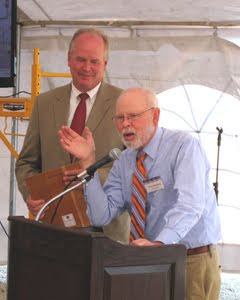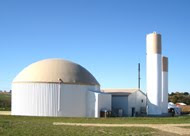by jboullion | Apr 1, 2011 | Uncategorized
From an article by Ron Seely in the Wisconsin State Journal:
WAUNAKEE – Sure, the cows on the farm run by Chuck Ripp and his brothers near here generate a lot of manure — about 7 million gallons a year.
But now they also generate electricity.
Call it cow power.
Thursday, Dane County officials were joined by farmers and utility officials and others to flip a ceremonial switch and power up the state’s first cooperative manure digester. Spearheaded by Dane County Executive Kathleen Falk, the $12 million project has been more than six years in the making.
When it is in full operation, the digester plant with its three huge tanks will process manure from three adjacent farms and a total of 2,500 cows. It will remove about 60 percent of weed-growing phosphorus from the manure. The digester will produce methane and that methane will be used to power generators that will churn out $2 million a year in electricity, enough to allow Alliant Energy to power 2,500 homes.
And, according to Dick Pieper, with Clear Horizons, the company that will run the plant, the entire operation can be run with an iPod.
“The efficiency of this plant is exceptional,” said Pieper. “It’s world class.”
Falk said the plant represents an important milestone in green energy production and in manure management in Wisconsin. Many digesters don’t remove phosphorus, which clogs lakes with weeds and toxic blue-green algae during warm months. But the Dane County plant was designed specifically to remove the nutrient.

by jboullion | Mar 29, 2011 | Uncategorized
RENEW is saddened by the death of former Representative Steve Hilgenberger, a solid and vocal supporter of renewable energy and other causes that exemplified his care for the people of his district and the State of Wisconsin. Representative. Hilgenberger was a major and tireless supporter of the 2009 Clean Energy Jobs Act.

Pictured above, Rep. Steve Hilgenberger, speaking at the dedication of the Montchevre-Betin digester, October 6, 2010 in Belmont, Wisconsin. On the left is Sen. Dale Schultz.
Rep. Hilgenberger exemplified the finest of pragmatic bipartisanship,
as well as gentle decency.
by jboullion | Feb 7, 2011 | Uncategorized
From an article by Heidi Clausen in The Country Today:
TURTLE LAKE – After some setbacks, ground will be broken this spring for an anaerobic cogeneration facility aimed at solving a growing dilemma for northwestern Wisconsin dairy plants.
GreenWhey Energy Inc. is on target to begin construction in late March or early April on a 70,000-square-foot digester plant in Turtle Lake that will recycle wastewater from dairy and food processing, turning it into renewable energy and fertilizer.
The plant, scheduled to be operating by Nov. 1, will employ eight to 10 people.
Along with helping the dairy industry turn a liability into a commodity, the plant is designed to reduce the load on Turtle Lake’s wastewater treatment plant.
GreenWhey is a privately held company spearheaded by Tom Ludy, who founded Lake Country Dairy in Turtle Lake in 2001.
Ludy outlined the company’s plans in a public meeting Jan. 25 attended by about 50 people in Turtle Lake. Ludy said the meeting was held to address any concerns about the project before construction begins.
GreenWhey would be the second project of its kind in Wisconsin and is unique in its number of investors, Ludy said. A similar whey digester facility at Kraft Foods in Beaver Dam is owned by the municipality.
State officials and dairy companies across Wisconsin are watching the GreenWhey project closely in hopes that this type of project could help the dairy industry manage wastewater more sustainably.
The approximately $15 million project is being financed by private investors, grants and low-interest government loans.
by jboullion | Dec 20, 2010 | Uncategorized
A news release for the Wisconsin Office of Energy Independence:
First-of-its-kind pilot size study to turn organic waste and
biobased plastics into a clean energy resource
MADISON, WI – In an effort to turn an organic waste stream and biobased plastics into an energy resource, the Office of Energy Independence, University of Wisconsin – Platteville (UW-Platteville), and UL – EnvironmentSM (UL-E) an Underwriters Laboratories Company, have joined forces to conduct the first pilot study in the nation to test anaerobic digestion of bioplastics as a co-feedstock.
“When perishable foods, such as meat or dairy items, reach the end of their shelf-life, the store must remove the product for proper disposal to a landfill,” said Judy Ziewacz, Director for the Office of Energy Independence. “If successful, the food packaging and plastic industry would be able to turn a waste expense into a profitable energy generator.”
Annually, more than 830,000 tons of organic waste is sent to Wisconsin landfills. If this waste was diverted to a digester, it could potentially generate 5 megawatts of renewable energy to power 5,000 homes.
UW–Platteville, with scientific partner UL-E, will use an existing 4-stage digester built by Hanusa Renewable Energy to run the pilot study.
“The pilot scale digester is the only one of its kind in the nation that we are aware of,” said Tim Zauche, Chemistry and Engineering Physics Chair at UW-Platteville. “If we can determine bioplastic can be processed through the system, then the question becomes will it contribute to renewable gas production and a quicker return on investment.”
“Business owners are seeking innovation to lower their environmental footprint,” said Joe Mecca, Business Development Manage for UL-E. “This has great potential to reduce waste-to-landfill while producing renewable energy. We look forward to working with UW-Platteville to test the feasibility of this concept and setting guidelines for the marketplace.”
The study will be conducted at Pioneer Farm, located about 5 miles southeast of the city of Platteville. Pioneer Farm is a key component of the Wisconsin Agricultural Stewardship Initiative, a statewide
collaboration between producers, state government and the University of Wisconsin System to evaluate best management practices in Wisconsin and form policies based on practices that will enhance the environment and produce a profit for business.
For more information, visit the Office of Energy Independence www.energyindependence.wi.gov, UW–Platteville www.uwp.edu or UL-E www.ul.com.
-30-
by jboullion | Nov 22, 2010 | Uncategorized
From an article by Kevin Murphy in the Telegraph Herald, Dubuque, Iowa:
PLATTEVILLE, Wis. — Pioneer Farm at University of Wisconsin-Platteville touts itself as a state-of-the-art agricultural research facility. However, it’s been lacking renewable energy systems that have become an increasing area of importance in agribusiness.
That changed Wednesday when the State Building Commission approved a $1.18 million bio-energy project that will produce about 7.5 percent of the campus’ electricity needs from the university’s 160-head dairy herd.
Anaerobic digesters, which turn manure into methane used to generate electrical power, typically need 600 cows to reach a break-even point. The Pioneer Farm digester will show that process can be economically feasible on a much smaller scale.
The farm will test other organic material in the digester such as cheese whey, food waste and byproducts from biodiesel processing to determine if they adequately supplement manure in the production of biogas.
Pioneer Farm currently buys all its energy from local utilities, but its master plan considers using power from renewable sources, including wind and solar. However, the intent of the digester project is to install a system compatible with the farm it serves.
“A unique aspect of the project is demonstrating a renewable energy system that is highly integrated into the current farming system with little modification to current livestock cropping and manure management practices,” according to the information supplied to the commission.
The system should save the farm $73,400 in annual energy costs and have a 14-year payback period. That is within the state’s energy-efficiency program that seeks a 16- to 20-year payback period for major projects.


